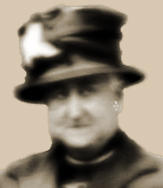"I wanna dwink!!!!"
Dude, the chauffeur, still being unwell, Lady Bracknell travelled to visit the osteopathic gentleman by train this week. There is nothing like public transport to maintain an elderly aristocrat's awareness of the fashions of the day (will the tracksuit never fall out of favour...?) and the behavioural patterns of the hoi polloi.
(As a semantic aside, Lady Bracknell should add that she is aware - given her classical education - that the "hoi" in "hoi polloi" means "the", and that the phrase "the hoi polloi" is therefore inexcusably tautologous. But she is at a loss as to how to avoid this syntactical faux pas without her words becoming so obscure as to be impenetrable to the average reader.)
In Lady Bracknell's own youth, screaming toddlers were regarded with an exceedingly jaundiced eye by the majority of adults. Indeed, Lady Bracknell recalls a conversation which she had about ten years ago with her esteemed mother when both were seated on a bench at London's zoological gardens. As a bawling child was propelled past them, Lady Bracknell enquired of her aged parent whether she and her brothers had screamed so loudly in public when they were children. She received the answer, "Certainly not! We would have been ashamed".
Lady Bracknell's memory does not extend back to the age when she herself travelled by pushchair (a mode of transport which most definitely would not have been referred to as a "buggy"), so must take her esteemed mother's word for the fact that the publicly whinging brat is a relatively modern phenomenon. It is certainly not an attractive one.
The majority of Lady Bracknell's outward rail journey on Tuesday afternoon was punctuated approximately every ten seconds by the importunate demands of a small boy to his father that he be given a drink. The child was nothing if not persistent, although he failed to achieve any great variety in his complaint, alternating as he did between, "I wanna dwink!!", and "I really need a dwink!!".
Leaving aside the question of the father's apparent inability to distract his child from its raging thirst, such areas of Lady Bracknell's brain as had not closed down in an attempt to block out the appalling noise pondered upon the question of why it should be that children can no longer undertake a twenty minute journey without expecting to be furnished with liquid refreshment. When Lady Bracknell and her brothers were children, they were occasionally taken on that same journey for educational visits to museums or, if they were very lucky, into a toy shop. They drank their glasses of milk with their breakfasts, and then did not expect to drink again until they were back home. So why are children and teenagers now so rarely seen without a drinks bottle clamped to their mouths?
Regular readers will perhaps not be surprised to learn that Lady Bracknell has a theory.
Many years ago, her ladyship was employed (fairly briefly) as a teacher in a secondary school near the town which she likes to think of (not terribly fondly) as "The Concrete Cowpat". During one of the "form periods", Lady Bracknell's charges were provided with a document to complete listing every morsel of sustenance which passed their lips in a twenty four hour period.
One week later, a dental specialist came in to talk to the class, bringing with him or her (this really is so long ago that Lady Bracknell genuinely cannot recall whether the visitor was male or female) the children's forms. These had been reviewed, and each child provided with an indication of the total number of teaspoonsful of sugar which it had consumed on the day in question.
The one thing which has always stuck in her ladyship's mind about that session was the astonishing fact that every can of non-diet soft fizzy drink contains six teaspoons of sugar. Even Lady Bracknell's rather dubious facility with mathematics is sufficient to calculate that a two-litre bottle must therefore contain thirty six teaspoons of sugar.
As the consumption of sugar promotes thirst, it is hardly surprising that children who swig sugar-solutions from morning to night become more, rather than less, thirsty
On an entirely separate matter, Lady Bracknell's "B never too busy to be beautiful" parcel has just been delivered, and she is pleased to report that Smaragadine has exactly the same divine fragrance as it had fifteen years ago.
(As a semantic aside, Lady Bracknell should add that she is aware - given her classical education - that the "hoi" in "hoi polloi" means "the", and that the phrase "the hoi polloi" is therefore inexcusably tautologous. But she is at a loss as to how to avoid this syntactical faux pas without her words becoming so obscure as to be impenetrable to the average reader.)
In Lady Bracknell's own youth, screaming toddlers were regarded with an exceedingly jaundiced eye by the majority of adults. Indeed, Lady Bracknell recalls a conversation which she had about ten years ago with her esteemed mother when both were seated on a bench at London's zoological gardens. As a bawling child was propelled past them, Lady Bracknell enquired of her aged parent whether she and her brothers had screamed so loudly in public when they were children. She received the answer, "Certainly not! We would have been ashamed".
Lady Bracknell's memory does not extend back to the age when she herself travelled by pushchair (a mode of transport which most definitely would not have been referred to as a "buggy"), so must take her esteemed mother's word for the fact that the publicly whinging brat is a relatively modern phenomenon. It is certainly not an attractive one.
The majority of Lady Bracknell's outward rail journey on Tuesday afternoon was punctuated approximately every ten seconds by the importunate demands of a small boy to his father that he be given a drink. The child was nothing if not persistent, although he failed to achieve any great variety in his complaint, alternating as he did between, "I wanna dwink!!", and "I really need a dwink!!".
Leaving aside the question of the father's apparent inability to distract his child from its raging thirst, such areas of Lady Bracknell's brain as had not closed down in an attempt to block out the appalling noise pondered upon the question of why it should be that children can no longer undertake a twenty minute journey without expecting to be furnished with liquid refreshment. When Lady Bracknell and her brothers were children, they were occasionally taken on that same journey for educational visits to museums or, if they were very lucky, into a toy shop. They drank their glasses of milk with their breakfasts, and then did not expect to drink again until they were back home. So why are children and teenagers now so rarely seen without a drinks bottle clamped to their mouths?
Regular readers will perhaps not be surprised to learn that Lady Bracknell has a theory.
Many years ago, her ladyship was employed (fairly briefly) as a teacher in a secondary school near the town which she likes to think of (not terribly fondly) as "The Concrete Cowpat". During one of the "form periods", Lady Bracknell's charges were provided with a document to complete listing every morsel of sustenance which passed their lips in a twenty four hour period.
One week later, a dental specialist came in to talk to the class, bringing with him or her (this really is so long ago that Lady Bracknell genuinely cannot recall whether the visitor was male or female) the children's forms. These had been reviewed, and each child provided with an indication of the total number of teaspoonsful of sugar which it had consumed on the day in question.
The one thing which has always stuck in her ladyship's mind about that session was the astonishing fact that every can of non-diet soft fizzy drink contains six teaspoons of sugar. Even Lady Bracknell's rather dubious facility with mathematics is sufficient to calculate that a two-litre bottle must therefore contain thirty six teaspoons of sugar.
As the consumption of sugar promotes thirst, it is hardly surprising that children who swig sugar-solutions from morning to night become more, rather than less, thirsty
On an entirely separate matter, Lady Bracknell's "B never too busy to be beautiful" parcel has just been delivered, and she is pleased to report that Smaragadine has exactly the same divine fragrance as it had fifteen years ago.











2 Comments:
I have to agree, your ladyship, Ribena is a drink that is favoured by the little ones and perfectly harmless if they drink it. I do however think they should learn politeness instead of bawling and screaming that they want a drink but that modern ways for you your lady ship! Weren't we all like them at one stage?
I have to say all your observations of life make me howl with laughter. I do question this though-Have you experienced any of your observations of life yourself your ladyship in your life?
So, Miss Katie considers Ribena to be "perfectly harmless", does she?
Perhaps she should read this.
Post a Comment
<< Home